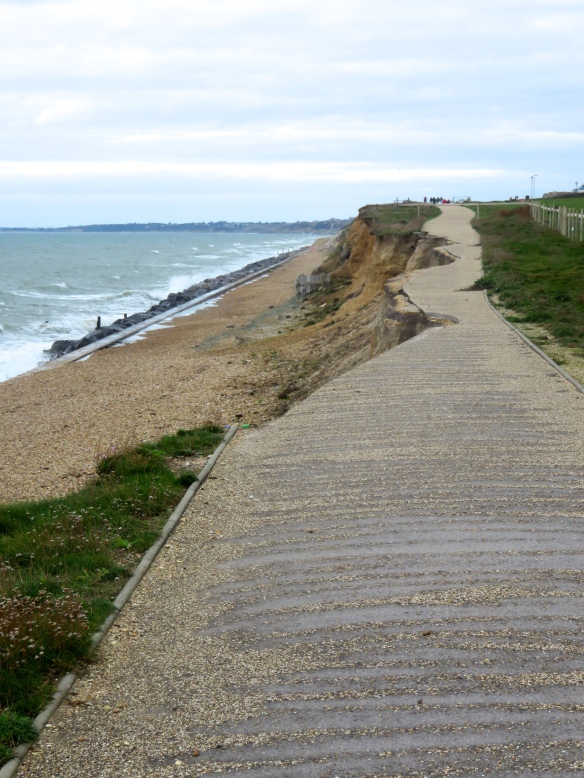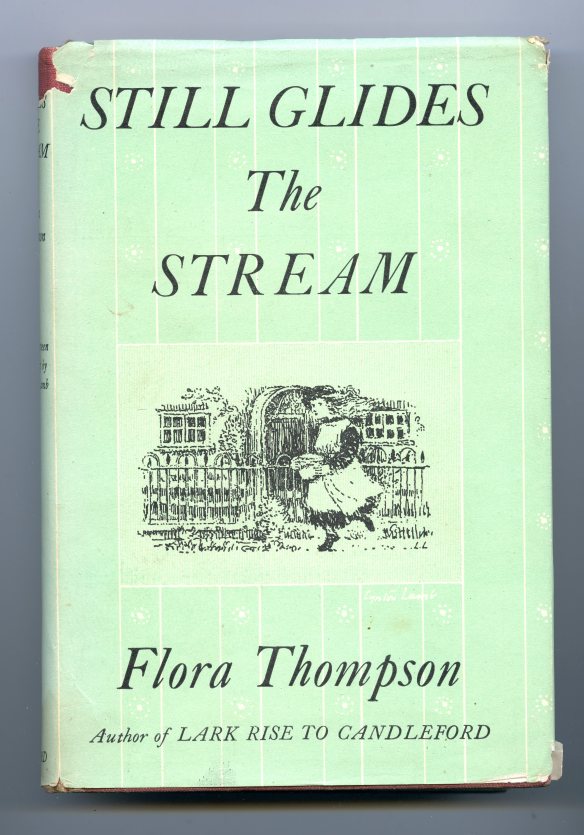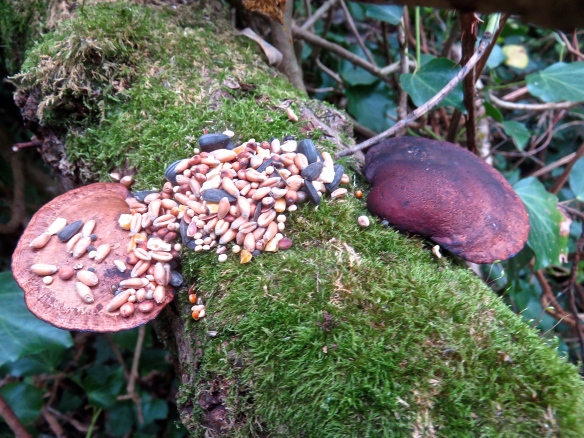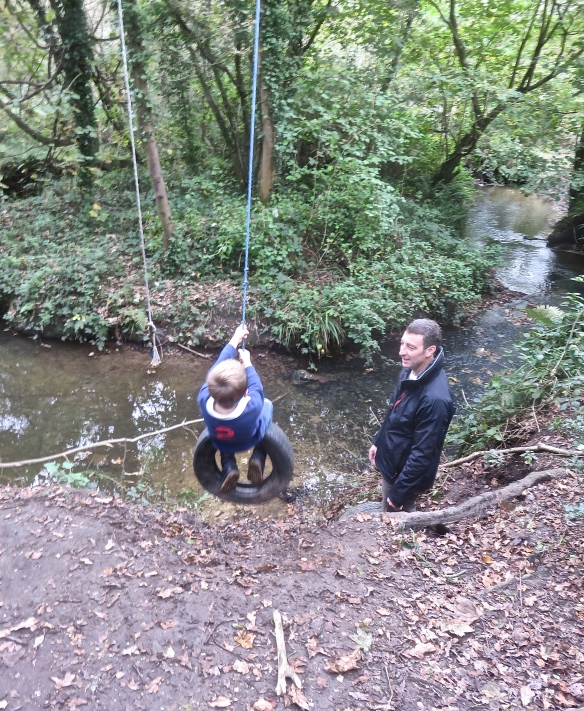I walked my normal route to Milford on Sea and back this morning. Waves buffeting the  beach were choppy and the wind blustery, but that did not deter families settling on the shingle, along which couples perambulated.
beach were choppy and the wind blustery, but that did not deter families settling on the shingle, along which couples perambulated.
 Part of the footpath that I had, only two days ago, described as safe, has tumbled down the cliff and been bordered by a protective fence.
Part of the footpath that I had, only two days ago, described as safe, has tumbled down the cliff and been bordered by a protective fence.
On the cliff top I met a man walking his dog, who was amused at himself for having forgotten to put his clocks back last night, the end of British Summer Time. He was impressed by how many jobs he had managed to do after having risen so early, but he thought the day ahead would be a long one.
In the Nature Reserve an elderly gentleman tipped his hat to me as we exchanged greetings.
 Watching fallen leaves sailing sedately on the surface of the stream, I was reminded of
Watching fallen leaves sailing sedately on the surface of the stream, I was reminded of  Flora Thompson’s book. My copy of this classic portrait of a nineteenth century Oxfordshire village is illustrated by Lynton Lamb.
Flora Thompson’s book. My copy of this classic portrait of a nineteenth century Oxfordshire village is illustrated by Lynton Lamb.
 At intervals along the trail, birdseed had been heaped upon tree fungus. Perhaps Hansel had been returning the favour of the white feathers.
At intervals along the trail, birdseed had been heaped upon tree fungus. Perhaps Hansel had been returning the favour of the white feathers.
 To a certain amount of trepidation by his mother, a small boy was having great fun on the swing I had noticed previously. She had not, fortunately, seen the first episode of ‘Grantchester’, in which a snapped rope bearing a similar swing gives James Norton, playing a charismatic Cambridgeshire village clergyman, an opportunity to emulate Colin Firth’s wet shirt scene in ‘Pride and Prejudice’. Based on the detective novels of James Runcie, ‘Grantchester’ is now a major ITV television series. Norton’s Sidney Chambers develops an unofficial partnership with Robson Green’s Geordie police sergeant.
To a certain amount of trepidation by his mother, a small boy was having great fun on the swing I had noticed previously. She had not, fortunately, seen the first episode of ‘Grantchester’, in which a snapped rope bearing a similar swing gives James Norton, playing a charismatic Cambridgeshire village clergyman, an opportunity to emulate Colin Firth’s wet shirt scene in ‘Pride and Prejudice’. Based on the detective novels of James Runcie, ‘Grantchester’ is now a major ITV television series. Norton’s Sidney Chambers develops an unofficial partnership with Robson Green’s Geordie police sergeant.
Flora Thompson’s story was published in 1948, and the detective series is set in the 1950s, so they are contemporaneous in period, if not in authorship.
Later, we watched the second episode of Grantchester. Well, we had to, didn’t we?
 Although we ate it in the evening, Jackie produced a superb traditional Sunday lunch. Slow roasted beef was accompanied by roast potatoes, parsnips, and Yorkshire pudding; thick gravy jam-packed with juices from the meat; brussels sprouts, carrots, cauliflower, and broccoli. After this we could just manage a custard tart. Jackie drank Hoegaarden, and I drank Castillo San Lorenzo reserva 2008 rioja. As is often the case when enjoying such a meal, we spoke of our mothers’ roast dinners of our childhoods in the ’40s and ’50s, which we converted to cottage pies on Mondays with the aid of a National or a Spong hand-operated mincer that was clipped to a tabletop. You put the pieces of left-over joint into the bowl at the top, turned the handle, and the minced meat was forced through a circular grill, and dropped out of the spout into a waiting container. Jackie, herself, used one when we were first married in 1968.
Although we ate it in the evening, Jackie produced a superb traditional Sunday lunch. Slow roasted beef was accompanied by roast potatoes, parsnips, and Yorkshire pudding; thick gravy jam-packed with juices from the meat; brussels sprouts, carrots, cauliflower, and broccoli. After this we could just manage a custard tart. Jackie drank Hoegaarden, and I drank Castillo San Lorenzo reserva 2008 rioja. As is often the case when enjoying such a meal, we spoke of our mothers’ roast dinners of our childhoods in the ’40s and ’50s, which we converted to cottage pies on Mondays with the aid of a National or a Spong hand-operated mincer that was clipped to a tabletop. You put the pieces of left-over joint into the bowl at the top, turned the handle, and the minced meat was forced through a circular grill, and dropped out of the spout into a waiting container. Jackie, herself, used one when we were first married in 1968.
Villages Of Oxford And Cambridge Shires

I remember my mother having one of hose grinders.
The title of the post suggests other times and places full of detectives, professional & amateur, mysterious adventures with perhaps a ghost or faerie off in the corner whispering secrets. Actually, the more I think on it, the name, Derrick Knight, sounds like a suitable protagonist for such a setting. 🙂
Many thanks, Joseph Neat thought 🙂
I still have one somewhere, though I haven’t used in a while. It’s in the garage with the pressure cooker. Times change…
Thanks very much, Quercus
My Grandma had something very similar to that grinder. Her chicken salad was legendary and minced so thin you could spread it on a cracker.